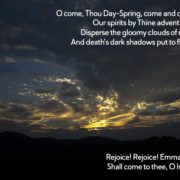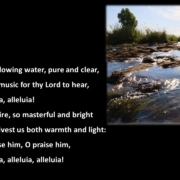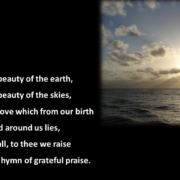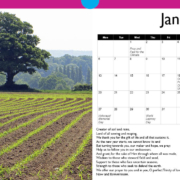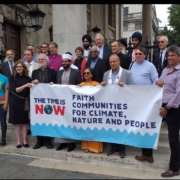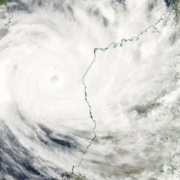Environment-related Lent Reflections, Lent Courses, and Bible Studies
Why should Christians care about the environment? Does God give us guidance for creation care in Scripture? To answer such questions, we turn to the Bible, seeking to discern God’s will.
We’ve gathered here some materials for Bible study. Most are online and free to download, but we’ve included some that require purchases as well. This list has been updated for Lent 2024.
Lent daily resources
40 Days With God’s Creatures
(Sarx, Lent 2021, app updated for 2022)
We profess a faith in Jesus, and we love animals. But do we put the two together? This Lent guide from Sarx, available as an online app, “offers users the chance to reflect theologically and creatively about animals and animal issues, using biblical and theological readings, art, videos, music, photography and poetry.” Contributors to the daily reflections include Professor David Clough, Professor Celia Deane-Drummond, Professor Matt Halteman and Professor Michael Gilmour.
(Christian Reformed Church North America, Lent 2015)
Twenty selections for Lent, all following the theme of ‘remembering we are dust, leaning toward a new creation’. Each contains a short reflection, a prayer, and an action to take.
Build Forward Better – #Fast4Earth
(Anglican Communion Environmental Network, for Lent 2021 )
Five weeks worth of short, bite-sized suggestions for more sustainable living, and reflections each day of Holy Week.
Daily Reflection-Action Calendar to Cultivate Climate Justice
(Creation Justice Ministries, 2024)
A simple, one-page calendar with a suggestion for each day – from doing your carbon footprint to watching an environmentally themed film or making goods from recycled materials
(Amica Benefice/JRI/Diocese of Lichfield/Season of Creation – 2018)
(Eloheh Indigenous Center for Earth Justice, 2022)
could it be a journey towards a new worldview? Could the journey be one of collective repentance from a consumer based way of
relating to creation? Could we move towards a new framework for relationship with Creator and creation?” To receive the guide, sign up on the Eloheh website (link above) and they will send it to you.
(Ignatian Solidarity Network, for Lent 2022 )
(Kai Nilsen, Renovare, 2013)
A free book to download, which invites you to reflect and make a journal as you go through Lent. Each week has a theme of less and more: less guilt/more grace (confession), less noise/more listening (solitude), less consumption/more compassion (fasting), less stuff/more freedom (simplicity), less spending/more peace (frugality), less me/more others (intercession), less fear/more love (responding to Holy Week).
(Downloadable at link above – weekly reflections)
Reflections for Ash Wednesday, each Sunday in Lent, Maundy Thursday, Good Friday and Easter. Each is by a different author and contains a Bible reading, reflection, and short prayer. Helpful for personal reflection, or could be a starter for a weekly home group’s discussions. This page holds all the Lent resources since 2017.
(Green Anglicans, for Lent 2021)
(Primates World Relief and Development Fund, Anglican Church of Canada, for Lent 2024)
Lent courses
In addition to the resources below, we heartily recommend two sources of weekly lectionary-linked reflections: Creation Justice Ministry’s Green Lectionary Podcast, in which theologians and environmentalists discuss the weekly readings, and Sustainable Preaching, which offers weekly creation-related sermon notes, and often a model sermon.
(JRI, 2023)
“This series of five bible studies have been written for the John Ray Initiative in 2023 by Revd. Rich Clarkson, and is based on a popular earlier series of bible studies written by Dena Burne in 2002 (the latter have now been withdrawn). It draws on both theological and scientific insight to help groups and churches think about what a Christian approach to environmental issues might look like. These are an ideal set of group studies for the Season of Creation or for a Lent Course, but could be used at any time.”
(Green Christian, 2024)
“Inspired by Green Christian’s Deep Waters Course, [this] asks ‘What kind of people might we need to be to face the challenges of climate change?’
Here is a space to go deeper together, and a space of contemplation that can resource meaningful action.
Covering topics of Love, Truth, Wisdom, Justice and Hope, this course uses music, prayer and Bible texts to inform reflection and discussion on creation care and the climate crisis, with the potential for positive and grounded outcomes for both community and church. It is discussion based with little input “from the front”, trusting that there is expertise, experience and faith enough in the room.”
(York courses, Lent 2021 – course)
(EcoCongregation Scotland, 2024)
(USPG, for Lent 2021 – short course)
Our world is in environmental crisis: how can Christians respond? This six-session course offers a biblical narrative of salvation to frame our climate response and challenges all Christians to take part in God’s work of redemption and re-creation. The sessions draw on perspectives from USPG’s partners around the world. Each contains a reflection, Bible passage to study, prayer and call to action.
(Christian Aid, published 2022 for Lent 2023)
A discussion guide for small groups. “This Lent reflect on the transformative nature of our faith and seeking justice. In this 6 week Talking Climate Justice small group discussion guide you’ll explore Lenten themes (repentance, sacrifice, redemption, reparation and restoration) to help you grapple with the realities of the climate crisis. Each week you’ll explore a new theme with bible readings, stories and prayers to stir up ideas of how you and your church can act together for climate justice. “
Single Session Studies
(Church of England, 2012)
Multi-Session Courses (teens and adults)
A * before the title indicates materials that would be particularly good for congregations just beginning their journey.
*A Christian Guide to Environmental Issues
(Margot and Martin Hodson, 2008)
“A valuable resource to help understand how we can live together for the good of all creation on this one planet with its finite resources. As such this book looks straight in the eye of the most serious set of environmental challenges humanity faces. Drawing together in accessible ways scientific evidence, biblical reflection, and practical ideas it will provoke you to better think, act and pray for the renewal of creation.” These were the Bishop of Norwich’s words commending the Hodsons’ excellent introduction. Chosen as ‘The Big Church Read’ it now has ten videos with starter discussions questions to accompany it.
*Cherishing the Earth
(Margot and Martin Hodson, 2008)
Six online Bible studies derived from the book of the same name, published by BRF. Can be used with or without the book. Each study has materials for discussing the theme, reflecting on particular passages, prayer, and practical applications. Themes are: Why cherish the earth, how to care biblically, careless dominion, impact on the poor, redressing the balance, and the future. Excellent introduction for churches beginning their explorations.
Christianity, Climate Change and Sustainable Living
(Nick Spencer and Robert White, Jubilee Centre and Tearfund, 2008)
Five Bible studies – they tie in with the book of the same name, but you don’t need the book to use them. Each covers a key area: creation, what it means to be made in the image of God, sin and redemption, love of neighbour, and what sustainable living might look like. Each session has an ice breaker activity, materials for praise and prayer, a study, background information, a challenge and a summary.
(Operation Noah)
Operation Noah’s ‘Ash Wednesday Declaration’ challenged the Church to recognise that care for creation in general – and responding to climate change in particular – is a key part of Christian mission. It did this by framing the challenges and responses to climate change in the light of seven Biblical themes: finding joy in creation, listening to the prophets, repentance, taking responsibility, seeking justice, loving neighbours, and acting with hope. The five sessions of this study pick up those themes – each includes material from the Declaration, a Bible passage relating to it, and suggestions for discussion and action. This study is no longer on Operation Noah’s website; contact us for materials.
(Studies originally written by Revd Dr David Pickering of the URC for ‘Roots and Branches’, modified for A Rocha Canada)
Five Bible studies that explore what different parts of Scripture – Genesis, the Pentateuch, Psalms, the Gospels, and the New Testament Letters – have to say about God, creation and humanity. Accessible, single page sessions have suggested Bible passages, background to the passages, discussion starters on the theological themes the passages raise, and a challenge to take away. (Click on Bible studies in the accordion on the left of the page to find the materials)
(Written by the Revd John Weaver for JRI and Tearfund)
Five sessions that aim “to mobilise congregations and churches in living out the mission of God and to see individual lives, communities, and the environment flourish. A core feature of this is to challenge congregations and communities in the UK to change their values from individual consumerism to justice and sustainability both locally and globally.” Sessions cover renewing our understanding of mission; the call to care for creation; the challenge to sustainable lifestyles; a biblical approach to economics; and the Church’s role as an agent of change.” Downloadable as A4 booklet.
(A project of Green Christian, 2020)
What kind of world do we want to see emerge after the coronavirus pandemic? This seven-session course offers space to reflect on that question from a Christian perspective. Each session has a theme, which is explored in liturgy, conversation and reflection. The course isn’t a ‘Bible study’ course in the customary sense – so some of the passages for reflection are Scriptural and others are drawn from secular sources.
(A project of Green Christian, 2020)
What kind of world do we want to see emerge after the coronavirus pandemic? This seven-session course offers space to reflect on that question from a Christian perspective. Each session has a theme, which is explored in liturgy, conversation and reflection. The course isn’t a ‘Bible study’ course in the customary sense – so some of the passages for reflection are Scriptural and others are drawn from secular sources.
(Ruth Valerio – Archbishop of Canterbury’s Lent Book 2020)
Saying Yes to Life follows the creation story in Genesis 1. Each chapter explores the element of creation from a given day (earth, waters, etc) – following references to it throughout the Bible, looking at how it is affected by the current environmental crisis, and offering suggestions for prayer and action to protect it. Mingling theological reflection and case studies drawn from different global contexts, the book offers a rich mix of things to ponder. There’s quite a lot of material, so it may be better for people who are already engaged. SPCK produced some very engaging videos to accompany the book – you might want to take a look at these just on their own.
*Tenants of the King
(Operation Noah)
“Tenants of the King is a new Bible-based, Jesus-centred resource… designed to help you and your church consider what the Bible has to say about today’s climate crisis.” Particularly useful for congregations which may not be used to thinking of climate as a Christian issue.
The full study guide includes booklets with materials for four 1-hr interactive group sessions; video interviews* with Rt Revd. Graham Tomlin (Bishop of Kensington), Rev. Mark Melluish (New Wine), Dr Ruth Valerio (Tearfund) and Dr Justin Thacker (Cliff College); and Leaders’ Notes.
Single copies of the booklets can be ordered on the Operation Noah website (£2.99 each); for information on full multimedia study guide email admin@operationnoah.org.* Note – Single booklet orders do not include access to videos.
Studies and courses for young people
All Things
(Young Evangelicals for Climate Action)
Six theological reflections with questions for discussion.

